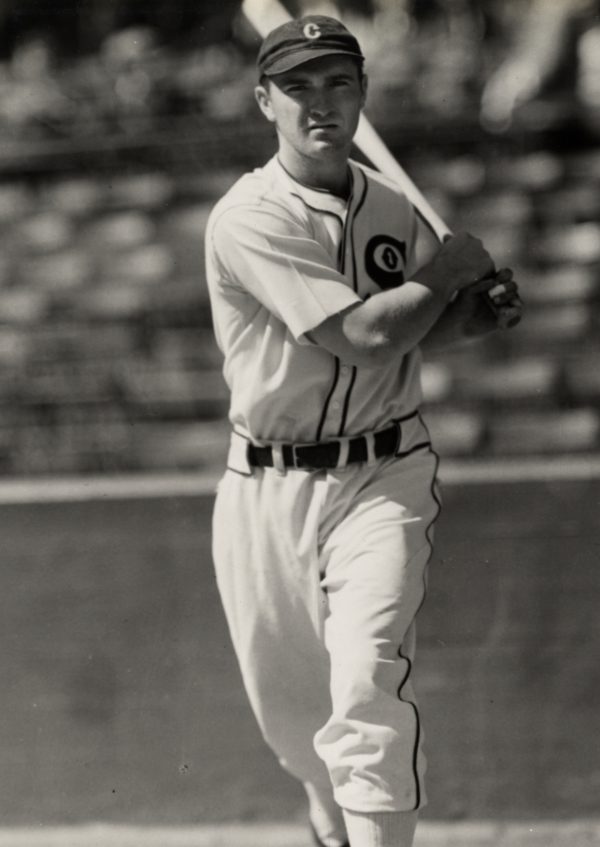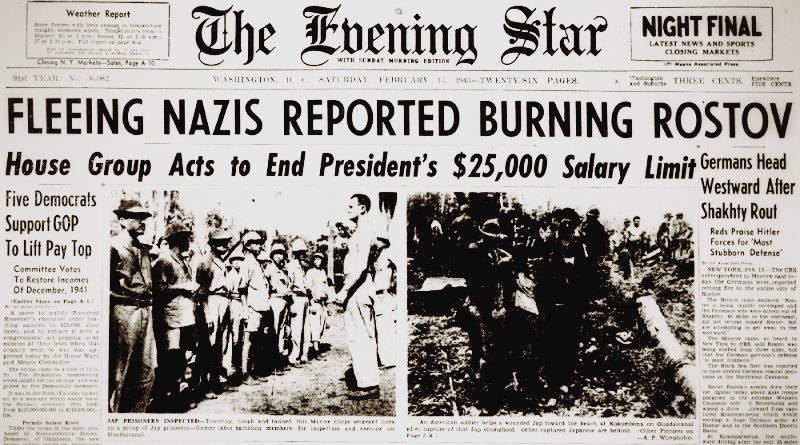World War II Chronicle: February 13, 1943
Click here for TODAY’S NEWSPAPER
First-ballot hall-of-famer Rogers Hornsby has returned this season as general manager of the Texas League’s Fort Worth Cats (for now at least, as the Texas League folds this year due to the war), and the front page reports he has sold the contract for Major League veteran Merv Connors to the American Association’s Milwaukee Brewers. Connors hasn’t been to The Show since he strung together 52 games over the 1937 and 38 seasons for the White Sox, hitting eight home runs. Three of those came in one game, off Jim Reninger of the Philadelphia Athletics. He almost had a fourth, but it fell just short of the wall for a double. At that point in baseball history only four players — including Lou Gehrig — had four-homer games.
Connors will get called up to play for the 13th Division Black Cats, but first he makes a combat jump into southern France as a private with 1st Battalion, 517th Parachute Regimental Combat Team. He will also fight in the Battle of the Bulge. Connors plays eight more years of minor league ball after the war, compiling 400 home runs and 1,629 runs driven in during his minor league career.

Dave Koslo was Connors’ teammate on the Black Cats. Koslo compiled a 4-8 pitching record over two seasons with New York Giants before the war. Unlike Connors, the only action Koslo saw was from a pitching mound. Once Japan surrendered he went back to the Giants, leading the league in ERA in 1949 and beating the Yankees in Game 1 of the 1951 World Series…
The Army plans on significantly expanding its paratrooper ranks, including building a new training base near Hoffman, N.C. (story on page 12). This is modern-day Camp Mackall, which is used to train Special Forces candidates… Sports on page 13.
Roving Reporter by Ernie Pyle
A FORWARD AIRDROME IN FRENCH NORTH AFRICA — (by wireless) — Although our fighter pilots are shooting down more German planes than we are losing, still they have a deep and healthy respect for the German airmen.
“They apparently brought their very best men to Africa,” one of the boys said, “because the newcomers sure know their business. There are no green hands among them.”
American fliers who have been captured and then escaped report that there seems to be a sort of camaraderie among airmen — not in the air, but on the ground. There is no camaraderie at all in the air — it’s fight to the death and nothing else.
The other night the boys were recalling stories from the last war. They had read how Allied and German fighters would shoot up all their ammunition and then fly alongside each other and salute before starting home. There is none of that stuff in this war.
Our pilots really lead lonely lives over here. There is nothing on earth for them to do but talk to each other. In two weeks you’ve talked a guy out, and after that it’s just the same old conversation day after day.
The boys hang around the field part of the day, when they’re not flying, then go to their rooms and lie in their bunks. They’ve read themselves out and talked themselves out.
There are no movies, no dances, no parties, no women — nothing. They just lie on their cots.
“We’ve got so damn lazy we won’t hardly go to the toilet,” one of them said. “We’re no damn good for anything on earth any more except flying.”
Flying a fighter plane is not comfortable. There is so much to do, and you’re so cramped, and you strain so constantly watching for the enemy. Also, fighter cockpits are not heated. The pilots get terribly cold at 25,000 and 30,000 feet. They don’t wear electrically heated suits. In fact, they can’t even wear too heavy flying clothes, for their bulk would make it impossible to twist around in the cockpit. They wear only their ordinary uniforms with a pair of coveralls on top of these, plus flying boots and gloves. And they can’t even wear really heavy flying gloves.
“Our bodies don’t get so cold, it’s our hands and feet,” one of them said. “Sometimes they get so cold, they’re numb.”
It’s funny,” said another, “but you’re never cold when you’re in a fight. You actually get to sweating, and when it’s over your underwear is all wet in back. Of course that makes you get all the colder afterwards.”
It’s interesting to sit in with a bunch of pilots in the evening after they’ve returned from their first mission. They’re so excited they are practically unintelligible. Their eyes are bloodshot. They are red-faced with excitement. They are so terrifically stimulated they can’t quiet down. Life has never been more wonderful. They tell the same story of their day’s adventures over and over two dozen times before bedtime.
The other night one boy couldn’t eat his supper. Another one couldn’t go to sleep.
The older boys listen patiently. They were that way not so long ago themselves. They know that battle maturity will come quickly. Just drop in a few weeks from now.
Evening star. (Washington, D.C.), 13 February 1943. Chronicling America: Historic American Newspapers. Lib. of Congress.
https://chroniclingamerica.loc.gov/lccn/sn83045462/1943-02-13/ed-1/
